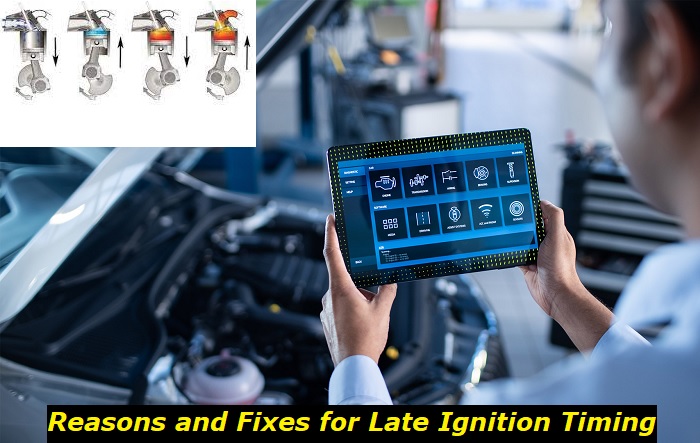In a combustion engine, ignition is the heart of the operation. This is the process where a mixture of fuel and air is ignited inside the combustion chamber. This is what generates the energy to keep your car running, so if this process doesn't happen your car won't run. Though late ignition is not as bad as no ignition, it will still have catastrophic consequences if not dealt with.
Internal engine problems highlights
- Level of importance:High
- Commonreasons:Mileage, poor maintenance, improper use, physical damage
- DIY inspection:Possible but may be complicated
- DIY repair:Possible, in some cases
- Price for repair:$250 - $1,500
- Can you drive?Depends on the issue
- Ways to fix:Locate the problem, outline possible fixes, replace or repair the worn-out parts

What Is Ignition Timing
To figure out how to fix ignition timing and the reasons why it can develop, first, you need a deeper understanding of what ignition timing is. So what exactly is ignition timing?
Ignition timing refers to the exact moment when the spark plug goes off igniting the air and fuel mixture inside your combustion chamber. When the piston compresses, the spark plug is supposed to ignite the mix at the right time.
The timing of the spark should be just right, not too early or not too late. This will ensure optimal performance and that you'd generate the maximum energy you can get from the combusting fuel. If the spark comes in early, you will get an early combustion, which is called pre-ignition. This will lead to engine knocking and other engine trouble along the way. On the other hand, if the ignition is late, it can result in reduced power output, poor fuel efficiency, and increased emissions, which we will discuss in detail below.
In modern cars, the ignition timing is controlled by the ECU, and in older vehicles, this is controlled by mechanical means.
Symptoms Of Late Ignition
The easiest way to identify late ignition is by scouting for its symptoms. The sooner you can identify these symptoms and diagnose the issue, the less damage you suffer.
1) Reduced Power
When the ignition is late, the force that pushes the piston upwards is weaker. This results in reduced power output from your engine. Without enough power, you'll notice sluggish acceleration and a lack of responsiveness from your ride.
2) Engine Knocking
Engine knocking is more evident when the ignition is early. That doesn't mean that you won't have engine knocking with late ignition. This is a result of the air and fuel mix igniting when the piston is moving upwards.
Since the piston is already moving upwards, the energy produced from the combustion is rendered useless. Now that the piston is not there to absorb the energy, the energy is forced into other parts of the engine. If engine knocking continues, it'll lead to numerous engine troubles in the future.
3) Reduced Fuel Economy
In the above, we mentioned that the fuel that gets burnt is rendered useless when you are experiencing late ignition timing. This will directly result in poor fuel economy as most of the time you'll be burning fuel without gaining anything from the combustion.
4) Difficulties Starting the Engine
By now you already know that late ignition timing significantly reduces the power generated. Without enough power, you'll have to crank the engine multiple times before it fires up. This'll be more prominent during cold climates where extra energy is required to fire up the engine.
5) Increased Emission
Late ignition results in unburnt fuel. This increases the emission of pollutants like carbon monoxide, hydrocarbons, and nitrogen oxides to the environment.
What Causes Late Ignition
Now that you know the symptoms and the adverse effects of late ignition, you might be wondering what the reason is for all this havoc inside your engine. Here are a few causes of late ignition,
1) Damaged Or Faulty Sensors
As mentioned, the timing of the spark or the ignition timing is controlled by the ECU. And the ECU relies on data from the sensors to properly calibrate the timing to get the best result. If your sensors are faulty, your ECU will be receiving incorrect readings. So the ECU will adjust the ignition timing incorrectly which could result in late ignition.
2) Worn Or Damaged Distributor
The spark plug might be creating the spark, but the high-powered current is provided by the distributor in older cars (carbureted ones). With time the distributor can get worn. This delays the current flow to the spark plug which directly results in a late ignition.
3) Faulty Ignition Module
The ECU decides when the timing of the ignition. Yet, the ECU cannot control the spark. This is where the ignition module comes in. The ECU sends the signal to the ignition module to activate the ignition coil. When the ignition module is faulty, it can cause delays in generating the spark which again results in a late ignition.
4) Engine Overheating
Often engine overheating is a result of other problems, so you might be wondering how an overheating engine can result in a late ignition. When the engine overheats, it can cause the fuel mixture to ignite prematurely or inconsistently, resulting in delayed combustion and late ignition timing.
5) Engine Modifications
When you go with engine upgrades like fuel injection, supercharger kits, turbo kits, air intake upgrades, or any other upgrades, you also need to re-calibrate the ignition timing. This is because the air-to-fuel ratio inside your engine changes with these upgrades. If you haven't calibrated your ignition timing after getting such upgrades, it could also result in late ignition.
How To Fix Late Ignition Timing
The solution for late ignition timing depends on what is causing the problem. So, you need to follow protocol depending on the cause of late ignition timing on your vehicle. Start by finding what is causing the late ignition in your vehicle. Here are some common and easy fixes that you can go through.
1) Make Sure Your Cooling System Is Doing Its Job
As mentioned above, an overheating engine can cause late ignition. If your engine does overheat, a warning light in your dash will illuminate. So, it is not hard to identify an overheating engine. Once you figure out that your engine is overheating, make sure to take the necessary action to ensure that it doesn't happen again.
Your cooling system is a good place to start. As long as it is functioning properly, your engine shouldn't overheat. If your cooling system is fine and your engine is still overheating, consider upgrading your cooling system. This is not only because of the late ignition.
Overheating the engine could lead to several other problems, so get it solved as soon as possible.
2) Replace Worn Or Damaged Parts
Depending on the reason why you are experiencing late ignition, you might have to replace some of your parts. This might include your sensors, ignition module, or your ignition coil. Once the diagnosis is done, replace the necessary parts.
3) Recalibrate Your Ignition Timing
In some cases, your ECU might need to be recalibrated or reprogrammed to get your ignition timing back to ideal. This may involve using manufacturer-approved software or tools to recalibrate the ECU's timing settings to the specified parameters.
4) Seek Professional Help
This is the best way to tackle late ignition timing. There are many automotive repairs that you can do by yourself with a basic toolkit. But if you are facing late ignition timing, it falls on the tough end of the spectrum when looking at DIY auto repairs. The primary reason for this is the fact that diagnosing the cause of late ignition is no easy task.
If you consult a mechanic, that person will be able to perform diagnostic tests to identify the specific cause of the late ignition timing. Once the specific cause is identified, working on a solution is much easier. A professional will have the right equipment and experience to get the job done accurately. This may involve using specialized diagnostic equipment to retrieve error codes, examining sensor readings, and conducting visual inspections of relevant components.
Fixing late ignition timing depends on delicate adjustment and complex systems. So, unless you consider yourself an expert and have all the necessary equipment, this is one repair that is better left to the professionals.
Conclusion
Late ignition is a serious issue that could significantly decrease performance, efficiency and even end up causing irreparable damage to the engine. As a vehicle owner, it is your responsibility to know the symptoms and how to fix late ignition timing along with its causes. With this knowledge, you could take proactive steps to address the issue of late ignition timing.
About the authors
The CarAraC research team is composed of seasoned auto mechanics and automotive industry professionals, including individuals with advanced degrees and certifications in their field. Our team members boast prestigious credentials, reflecting their extensive knowledge and skills. These qualifications include: IMI: Institute of the Motor Industry, ASE-Certified Master Automobile Technicians; Coventry University, Graduate of MA in Automotive Journalism; Politecnico di Torino, Italy, MS Automotive Engineering; Ss. Cyril and Methodius University in Skopje, Mechanical University in Skopje; TOC Automotive College; DHA Suffa University, Department of Mechanical Engineering






Add comment